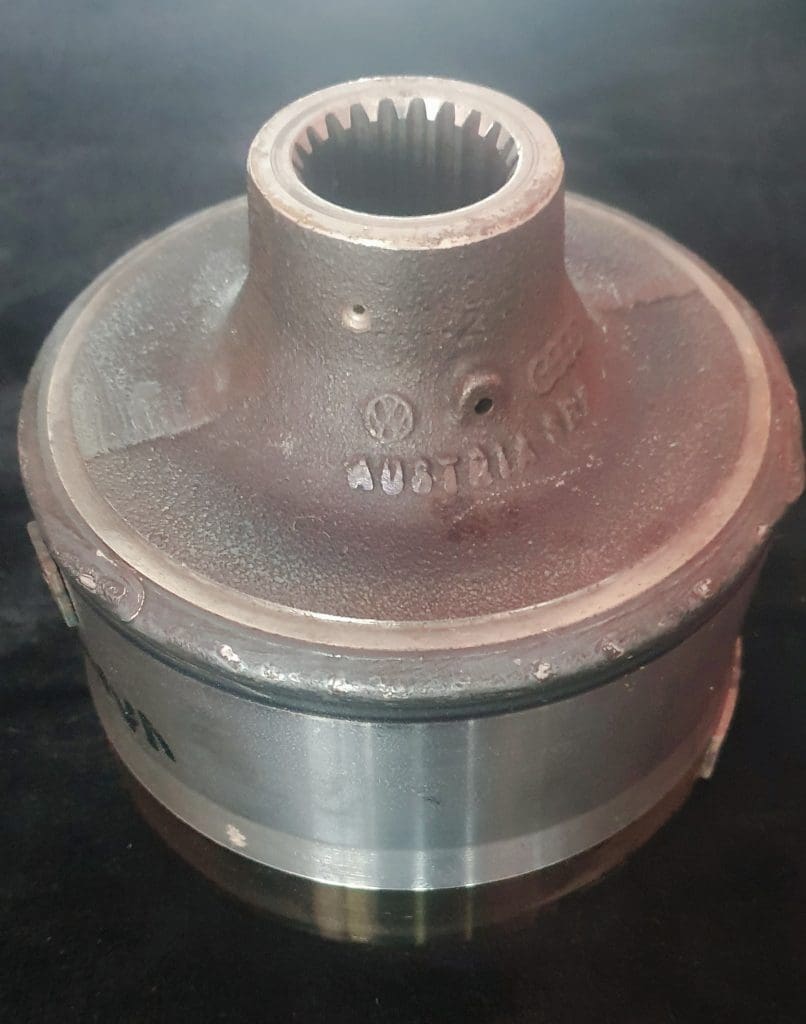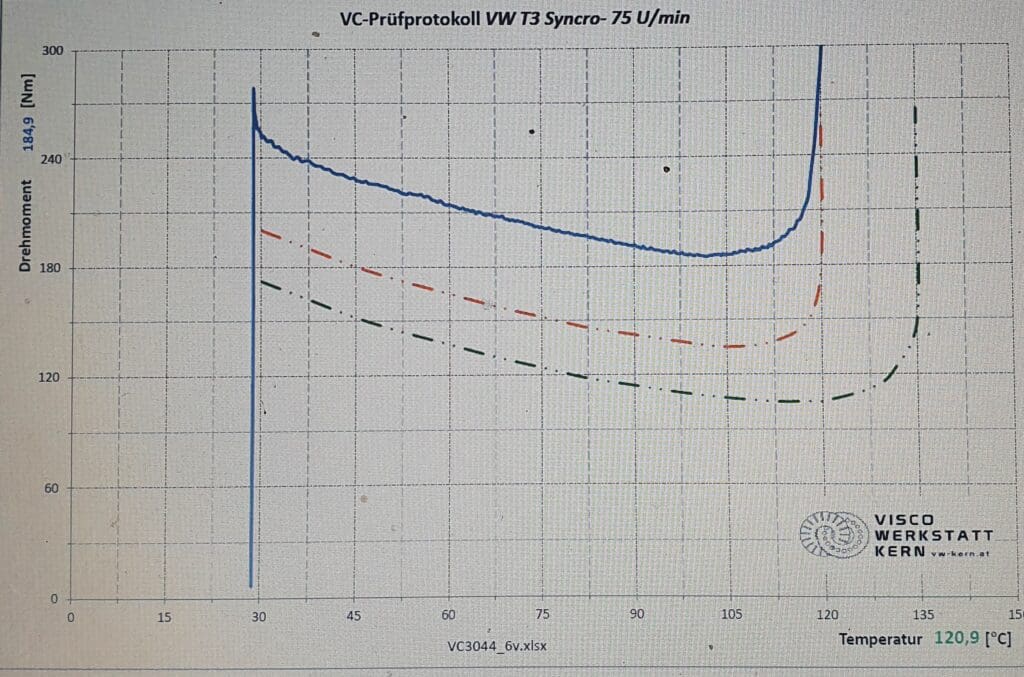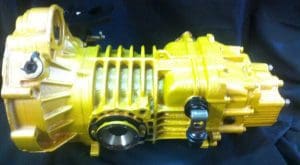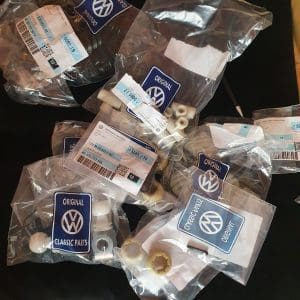
VW T3 T25 Syncro Viscous Coupling Explained
VW T3 T25 Syncro Viscous Coupling explained.
The Syncro full time 4WD uses a Viscous Coupling or VC to engage and disengage the 4WD on a syncro. To explain it in simple terms when the rear wheels start to slip the Silicon Fluid in the Viscous coupling locks and transfers the drive to the front wheels giving you 4WD. (in reality the 4WD is never totally disengaged as there is always 1-5% slip but this is negligible).
The original VW Syncro engines such as the Petrol 2.1s and Turbo Diesels made peak torque high in the rev range thus the stock VCs were set up to engage 4WD to suit these higher revs, more about this below.
Viscous Coupling Service life and No 1 Cause of VC Failure
Viscous couplings have been considered to be a wear part and should be reconditioned after 100- 200,000 kms as a guide. rough guide
However Viscous couplings also suffer from an inherent design fault this being a failure to regulate the pressure in the Viscous Coupling, This leads to leaks and the worst case of extreme hardening of the VC. This is the No. 1 cause of VC failure. VC failure can occur in 3 ways
Extreme hardening of the Viscous Coupling occurs when the Viscous Coupling has sucked gear oil from the Front Differential into the Viscous Coupling. This is caused by the formation of a vacuum due to the high thermal expansion of the silicon oil in a lot of cases this is more apparent in low temperatures during winter.
Hardening is generally caused by age. Gradual hardening is a result of aging silicone oil (oxidation), which leads to the thickening of the fluid. Silicone oils with high zero viscosity (of up to 300k) are more vulnerable to this.
Failure Viscous Couplings can also leak fluid out. This is generally caused by over heating where the silicon fluid bursts out into the Front Differential. This renders the vehicle only able to operate in 2WD.
Causes of leaks and damage can result in buckled lids, bulging of the housing. failure of X rings and damage to the plates of the Viscous Coupling
Failure of Viscous Couplings can be very costly. In addition to getting your Viscous Coupling repaired “Hard” can cause considerable damage to your drivetrain including your gearbox. and front differential which can be very costly.
Maintaining your Viscous Coupling
One simple thing you can do to help prolong the life of your Viscous Coupling is to regularly rotate your tyres and ensure that all your tyres have the same tread depth. VW recommends that the difference in the tyre depth between front and back tyres should not exceed 2mm.
Driving with unmatched tyres with varying amounts of wear or pressure can put strain on the Viscous coupling and lead to premature failure.
Also don’t tow for extended periods and never have the vehicle towed with a front or rear end lift – this is dangerous, will overheat the VC quickly and strain transmission too.
Testing your Viscous Coupling
VW Viscous Coupling Test
To test a Viscous Coupling it is recommended by VW in their factory manual to do the test in a dynamometer. The test also works in a conventional brake test bench if the rollers turn freely when switched off.
Instructions are as follows
• Bring VW T3 T25 Syncro to operating temperature by driving on a highway or equivalent
• Drive the vehicle with the rear wheels on the rollers
• ATTENTION: Keep space in front of the vehicle!
• Engage G-gear and drive rear wheels at idle speed > the viscous coupling absorbs the speed differences between front and rear axles without locking. The bus remains in the test bench without the engine dying. (Otherwise the VC is extremely hardened)
• At accelerating from idle to 2000 – 3000 rpm, the bus should be pulled of the brake tester via the front axle. If the bus does not come out of the brake tester at all, then the VC is most likely failed open.
DIY Viscous Coupling Tests These are 2 tests to give you a general impression of the condition of your VC there are others but they are quite dangerous. However these tests are only approximate and we cannot be held responsible for any damage incurred if you misdiagnose the condition of your VC.
To Check if the Viscous Coupling is Hard
Bring VW T3 T25 Syncro to operating temperature by driving on a highway or equivalent.
Put the Vehicle in G Gear and lock the steering and drive at idle speed if the engine cuts out the VC is Hard.
To Check if your VC is Failed Open
Bring VW T3 T25 Syncro to operating temperature by driving on a highway or equivalent.
Drive the vehicle to a wet grassy slope or equivalent engage G Gear and try to drive up if the back wheels spin and the vehicle does not climb up your VC is failed open.
Viscous Couplings by VW Kern
Viscous Couplings are reconditioned by VW Kern our selected partner as they are the at the cutting edge of Viscous coupling technology and research. They even researched and built a Viscous coupling test bed as part of their PHD. VW Kern can tune your VC to suit your application and engine set up. VW Kerns also use an inert gas to fill their VCs as it reduces oxidisation of the silicon fluid and this gives a longer working life of the VC. They also fit a valve in the Viscous coupling which helps to eliminate the major cause of VC failure. VW Kern can also recondition and improve Viscous Couplings for T4s aswell.
Standard, Sports Viscous couplings and Solid Shafts Finding the right one for you.
Standard ,Sports Viscous couplings and Solid Shafts?
Viscous couplings can be supplied in various stiffnesses and tuned to suit various engine installs and applications.
The original VW engines such as the Petrol 2.1s and Turbo Diesels made peak torque high in the rev range thus the stock VCs were set up to engage 4WD to suit these higher revs.
More modern engines often have the torque kick in at much lower RPMS. Also different applications such as use in sand or heavy off roading may call for stiffer Viscous Couplings which will engage quicker.
Sport Viscous couplings for TDI and Subaru engine Conversions
As more modern engines like TDIs and Subarus have different torque curves from stock VW T3 engines it is necessary to tune the VC, so it engages at the correct torque revs.
As torque kicks in lower in the rev range with these engine conversions a stock VC may not engage at the right place. This will allow the rear wheels to spin and engaging the 4WD too late or not engage at all thus rendering the 4WD system useless, this will lead to you losing grip and getting stuck.
What is required is a slightly stiffer VC tuned to the engine a stock VC kicks in at 120 Nm (green line on graph below) however VW Kerns can tune your VC safely up to 180Nm with a decoupler (Blue line on graph below). Red line is the limit of a VC without decoupler which is approx. 150Nm. Most stock working VCs will be between the green and red line.
The stiffer 180nm and 150nm are recommended for both TDI and Subaru conversions however these are only guides as depending on your vehicle and use VW Kern can advise the correct set up for you.
The Stiffer or Sports VCs 180Nm are generally described as sports VCs and will engage the 4WD system a lot faster than a standard VC these are particularly useful for driving off road in very loose conditions such as sand, snow or very wet mud where the 4WD will be more responsive. However, a sports VC cannot be used on the road so a decoupler is needed.

Solid shafts
Another alternative to the VC is a solid shaft which replaces the VC with a hardened steel shaft this will connect the drivetrain completely with no slip and provide 100% of power and torque through the drivetrain giving maximum traction to all wheels. This is only for driving off road, this needs a decoupler to able to drive the van on road. This is not recommended as it can be very damaging to the drivetrain if resistance is encountered as there is nowhere for the force to be cushioned as in the case of a VC.
More information and a much more detailed descriptions of Viscous Couplings can be found at VW Kern’s site here. Other sources of info include articles by Club 80 90 Syncronauts
and Syncro Org
http://syncro.org/VCTest.html


